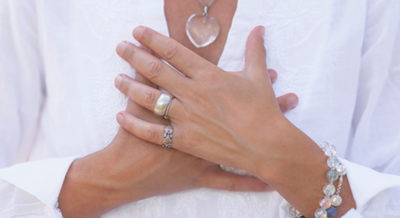
Paula, a service user representative, shares a deeply personal reflection on the freedom that comes from learning to forgive.
In a recent blog, I looked at how forgiving ourselves is an important part of healing. Forgiveness is a vital process for anyone who is serious about getting well. It’s one of the best things you can ever do for yourself.
You deserve to give yourself a second chance — for mistakes made in innocence, mistakes that weren’t malicious, but made through ordinary human frailty.
Forgiving others is different
Forgiving others is a completely different thing. It can be a far greater challenge.
We all have people in our lives we need to forgive. As a well-known teacher once said: "We will be forgiven as we forgive others."
Everyone has been hurt at some point in life. Some have been wounded so deeply, it would cause others to gasp in disbelief. Others may have suffered to a lesser extent. But deep within, there can be a wound, something so painful it cries out to be healed.
It’s like a weight we carry, robbing us of peace, hijacking our thoughts, and disturbing our inner life.
The burden of unforgiveness
Millions of people live like this every day. They walk through life carrying a burden, like an old person hunched over under the weight of a heavy sack. They can’t look up, can’t see beyond their feet. They become, in many ways, prisoners of their own pain.
And so are we if we live this way. Deep inside, we carry what feels like a growth; made up of all the big hurts that have happened over the years.
The little hurts, we usually manage. They annoy us, but we can let them go. They don’t live on in our thoughts.
But the bigger hurts, they’re different. They echo and re-echo in the unconscious mind. They cry out from a very deep place. That cry is a sign that we haven’t healed, or at least, haven’t healed enough.
Why? Because we haven’t forgiven.
Unforgiveness keeps us trapped
Unforgiveness is a kind of poison. It keeps us locked in place. The hurt might be painful, but unforgiveness is an even harsher taskmaster.
It feeds the resentment and the venom we feel. It’s like something rising from the gut, spilling into our lives. A memory that repeats and repeats, something we can’t contain.
It needs healing. And that healing can only come from forgiving those who hurt us.
Our enemies are closer than we think
We all have enemies. Most of the time, we know exactly who they are. Their faces come to us — by day and by night.
We see the look they gave us when they hurt us. It haunts our thoughts, and our sleep.
We want to be free. And we can be free — if we’re willing to forgive.
Our enemies may not be in trenches in a distant land. They live in our heads and in our hearts when we don’t forgive.
They only continue to hurt us if we allow it, and we allow it when we choose not to forgive.
Forgiveness sets us free
Forgiveness empties the gut of hate. It bursts the bubble of resentment. It sets us free.
Because we are prisoners, until we set ourselves free. And we do that through forgiveness.
It’s not easy. The faces of those who wronged us may still come to mind often. But try to let them go. Loosen your grip. Let go of the resentment and the hate.
Let your mind and your body slowly release it. It won’t happen all at once, but it will happen.
Try spending four or five minutes each day in stillness. Picture the people who hurt you. See their faces and say in your mind: "I forgive you."
Do this daily. It may not feel real at first, but over time, it will. Eventually, you’ll start to believe it. And that will bring peace.
You will feel the change
As forgiveness grows, your rage and indignation will begin to fade. The pain may still be there — but now you’re dealing with just the hurt, not the resentment and rage on top of it.
That’s a better place to be. And as time passes, you’ll feel better. The painful memories will become less vivid.
You’ll become free.
You’ll have opened the door of your prison. And you’ll be walking through it, to the other side.
Help is available
Don’t forget that support is available. Talking therapy really helps. Counselling or psychotherapy can be a powerful place to start.
Many people begin their healing journey in therapy — sometimes it’s the first time they’ve spoken about what happened. Therapists can be the first people to hear a truth that has never been told before.
This kind of release is powerful. It can lead to others in your life understanding what you’ve been through.
Help is to hand. Don’t throw your hands up in despair. Keep forgiving. Trust the process. Take heart.
You can heal.
And the healing can start now.
Do your four or five minutes of daily forgiveness. Keep going.
You will be glad you started
In time, you’ll look back and realise how important this moment was. How vital it was to begin forgiving.
You’ll be glad you started. The sooner you begin, the sooner the healing begins.
Open the door of your heart. Forgive your enemies. And take the first step towards a life that sets you free.
All views and opinions expressed here are the author’s own.
If you're affected by any of the issues raised in this article, or if you are worried about your own or someone else's mental health, please know that help is available. You can find more information and supports below.


